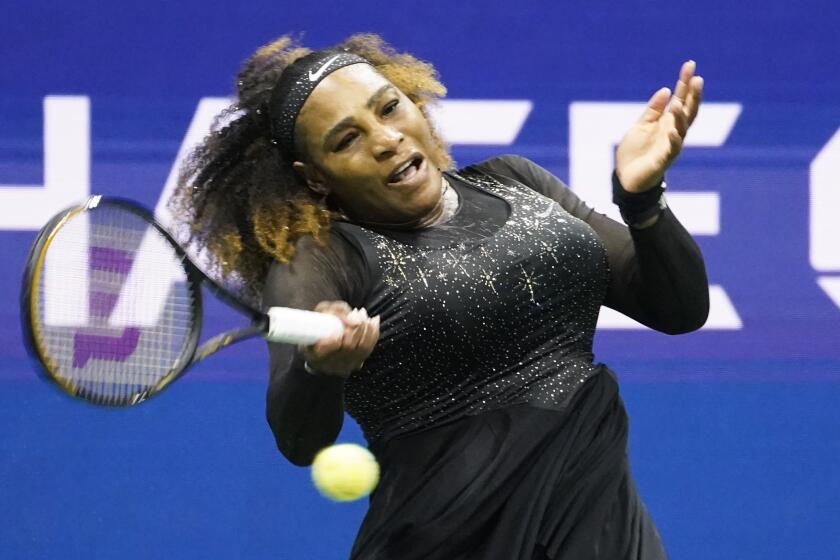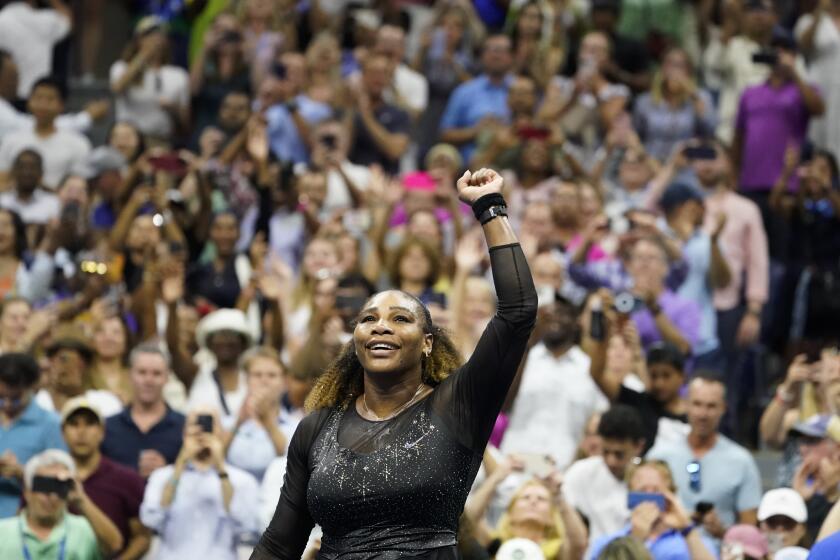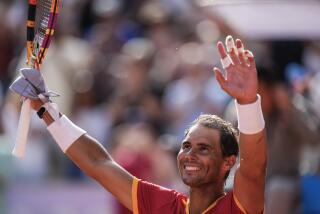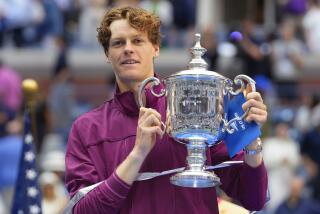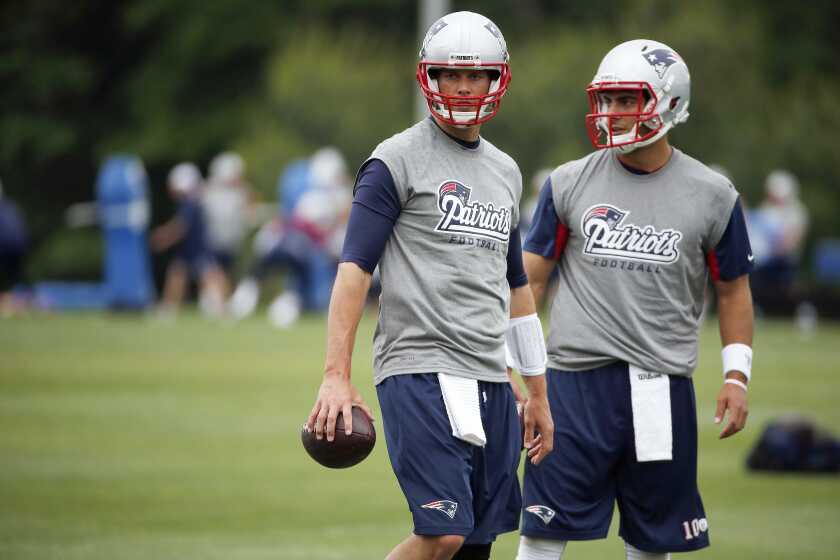Column: Rafael Nadal, who has battled injuries, shows he still has fight in U.S. Open win
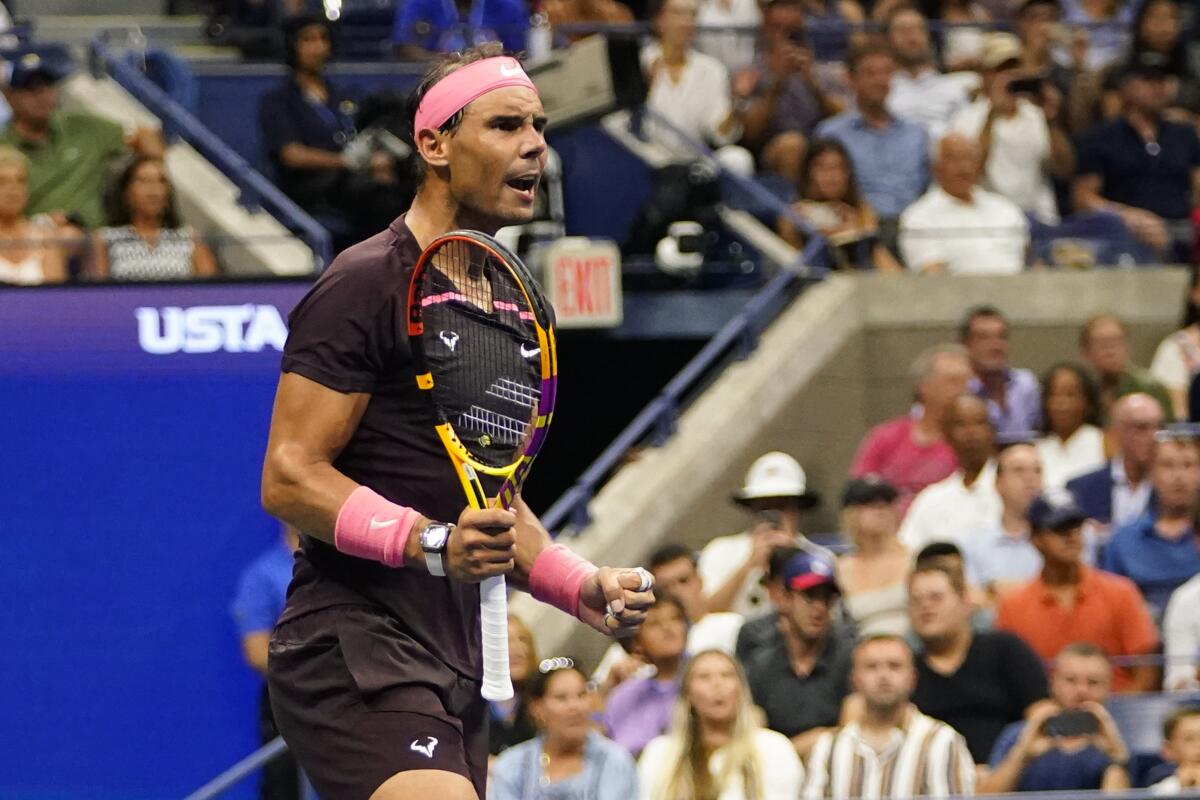
NEW YORK — Rafael Nadal has always played every point as if it might be the last of his career, relentlessly digging and battling until the lights go out. His chronic foot problems and recent abdominal tear now mean that any point might truly be the last of his career if his worn-out body won’t allow him to continue.
Nadal, 36, won the Australian Open this year and followed up by winning his beloved French Open for the 14th time, giving him a men’s-record 22 Grand Slam singles titles. A rare calendar-year Grand Slam seemed possible when he reached the semifinals at Wimbledon, but the abdominal injury forced him to withdraw. It lingered, limiting his preparation for the U.S. Open.
Still feeling discomfort, limited with his serve, Nadal came to New York with more hope than faith. “I have what I have,” the four-time U.S. Open champion said before the tournament, “and with the tools I have today, I hope to be competitive enough to give myself a chance.”
Nadal needed to reach deep into his toolbox to subdue Australian wild card Rinky Hijikata, who was playing his first main-draw match in a Grand Slam event. Nadal clinched it on his fifth match point, threading a fierce forehand down the line to secure a 4-6, 6-2, 6-3, 6-3 victory under the closed roof at Arthur Ashe Stadium.
It wasn’t a masterpiece, but he didn’t need one. He merely had to be sure his body would permit him to play every point as if it might be his last.
Playing in what could be the final Grand Slam of her prolific career, Serena Williams won her first-round match at the U.S. Open on Monday night.
“In some way, [this] was not the day to play perfect. [It was] a day to just make the job done, and that’s what I did,” said Nadal, the No. 2 seed. “Happy for that.”
He was grateful for match play after a layoff. “You need to be humble enough to go through this process and accept that you need to fight, and you need to accept that you’re going to suffer,” he said. “That’s what I did today.”
Sloane Stephens, the 2017 U.S. Open champion, also had to rally Tuesday, fighting back for a 1-6, 6-3, 6-3 victory over Greet Minnen. But other notable past Slam singles champions made early exits.
Two-time U.S. Open champion Naomi Osaka, unseeded here after missing time because of injury as well as depression and anxiety, was outplayed by No. 19 Danielle Collins, 7-6 (5), 6-3, in a quality match that should have been a final. Seven-time Slam singles champion Venus Williams, 42, had the crowd at Arthur Ashe Stadium behind her, but Alison Van Uytvanck of Belgium was too much for her in a 6-1, 7-6 (5) victory.
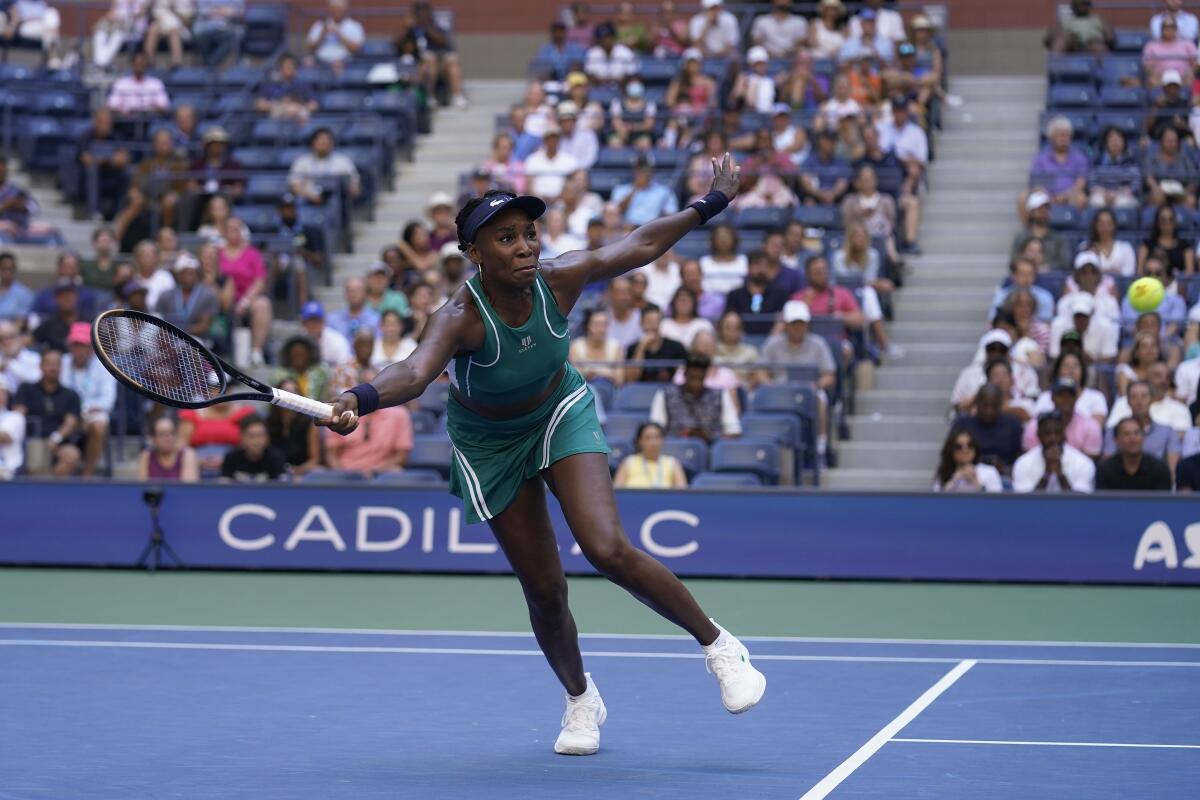
It was tough to see the once-dominant Williams, who debuted here in 1997 and won the title here twice, unable to cover the court. But unlike her sister Serena, she hasn’t mentioned retirement. The Compton-raised sisters plan to play doubles this week. “I just love being here, love playing here, the excitement of getting here, and the lead-up is all just — it never gets old. It’s so sweet,” Venus said.
Emma Raducanu of Britain, who has struggled since she won the U.S. Open a year ago, fell to Alize Cornet 6-3, 6-3. Her disappointment was mixed with relief. “In a way, the target will be off my back slightly. I just have another chance to claw my way back up there,” she said. Also clawing back is 2020 Australian Open winner Sofia Kenin, who lost to Julie Niemeier of Germany 7-6 (3), 6-4.
Two potential roadblocks for Nadal at Flushing Meadows vanished when Roger Federer (20 Slam singles titles) skipped the Open to recover from knee surgery and Novak Djokovic (21 Slam singles titles) was barred from entering the United States as a noncitizen who hasn’t been vaccinated against COVID. Two other obstacles disappeared Monday, when No. 4 Stefanos Tsitsipas was dismissed by Daniel Elahi Galan of Colombia 6-0, 6-1, 3-6, 7-5 and No. 10 Taylor Fritz of Rancho Palos Verdes fell to qualifier Brandon Holt, son of Tracy Austin.
But No. 3 Carlos Alcaraz of Spain advanced Tuesday, as did No. 9 Andrey Rublev and No. 11 Jannik Sinner. Sixteen-year-old Learner Tien of Irvine pushed No. 32 Miomir Kecmanovic and had a break point midway through the third set, but the Serbian pulled away to win 3-6, 6-1, 6-3, 6-3.
Serena Williams wins her first round match at what is likely her final U.S. Open as a competitor.
“I was a little nervous, but I remembered I didn’t have anything to lose going into that match, playing an older and more experienced player,” said Tien, who is considering college and will compete in the junior U.S. Open later this week. “Just go out and play freely, and just take my chances.”
No American man has won a Slam singles event since Andy Roddick won the U.S. Open in 2003. Fritz appeared to have a shot until he was derailed by Holt; at least he has time on his side at age 24. Sam Querrey, who peaked at No. 11 in 2018, retired from singles competition after his first-round loss to Ilya Ivashka on Tuesday. Steve Johnson, 32, an NCAA singles and team champion at USC, lost his first-round match in straight sets to No. 17 Grigor Dimitrov. Jack Sock retired because of injury in the fourth set of his match against Diego Schwartzman. Hope remains in Brandon Nakashima of San Diego, Sebastian Korda, Tommy Paul, John Isner, Frances Tiafoe and Jenson Brooksby.
At the rate the American men are going, they will still be chasing that next Slam title by the time Tien is ready to play against the big boys. “I think it would be really cool to be the one that breaks the drought,” Tien said, “but I still feel I’m a bit of a ways away from that.”
Nadal, playing in New York for the first time since 2019, will face Fabio Fognini of Italy on Thursday. Nadal holds a 13-4 advantage in head-to-head matchups, but that’s almost secondary to him. “I am enjoying the fact I am here,” he said.
Everyone else will enjoy it too for as long as his body will allow.
More to Read
Go beyond the scoreboard
Get the latest on L.A.'s teams in the daily Sports Report newsletter.
You may occasionally receive promotional content from the Los Angeles Times.

